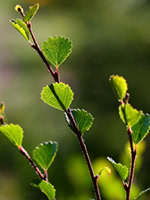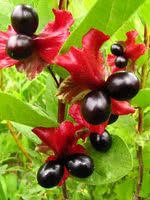Mon-Fri 9am - 5pm Mountain time
Bog Birch vs Bracted Honeysuckle
Betula pumila
Lonicera involucrata
NOT AVAILABLE THIS SEASON - MIGHT RETURN
NOT AVAILABLE THIS SEASON - MIGHT RETURN
Bog Birch is a hardy, deciduous shrub native to North America. It thrives in wetlands, riparian zones, and boreal forests, and can be found as far north as the Arctic Circle—making it one of the few woody plants to grow in such extreme climates.
In Western Canada, it is especially common in moist lowlands, along streambanks, and in peatlands. Beyond its ecological role in stabilizing soils and supporting wildlife, Bog Birch is frequently used in reclamation and restoration projects due to its resilience and ability to establish quickly in disturbed or degraded landscapes.
Note: We use Bog Birch for Betula pumila. This species is also known by many other common names, including Dwarf Birch, Swamp Birch, and others. Please confirm the scientific name to ensure you are ordering the correct plant.
Bracted Honeysuckle is a shade loving shrub that is distinguishable from other honeysuckles by its square stem and pointed leaves. Native to most of North America, this honeysuckle is found along swamps, rivers, riparian zones and moist wooded areas.
If you have a erosion control project in mind, consider Bracted Honeysuckle.

